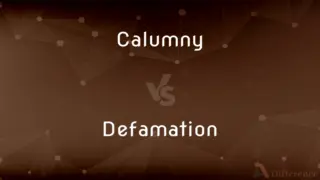Festival vs. Carnival — What's the Difference?
By Tayyaba Rehman — Updated on November 2, 2023
A festival is a broad term for a set of celebratory events, often with religious or cultural significance, while a carnival is a specific type of festival known for parades, costumes, and revelry before Lent.

Difference Between Festival and Carnival
Table of Contents
ADVERTISEMENT
Key Differences
A festival is typically a period or event celebrating a particular community, culture, or phenomenon with social gatherings and a variety of activities like music and food. A carnival, historically linked with the pre-Lent season, is characterized by public celebrations, parades, and masquerades, emphasizing indulgence before the fasting period.
Festivals often have deep historical and cultural roots, with purposes ranging from religious reverence to the commemoration of significant events. Carnivals, though they can be festivals themselves, are specifically marked by high energy, music, dance, and elaborate costumes, with origins traceable to Catholic traditions in Europe.
While festivals can be seasonal, religious, or artistic, serving a multitude of purposes such as harvest celebrations or artistic showcases, carnivals are predominantly associated with a specific timeframe before Lent and are a symbolic expression of social upheaval where norms are temporarily relaxed.
Festivals can occur at any time of the year and may not involve costumes or high-energy parades but rather focus on community activities and observances. Carnivals, however, are particularly noted for their grand and vivid processions, the air of festivity accentuated by masquerades and street parties.
The difference in atmosphere between the two is also notable: festivals can range from solemn to joyous, with a focus on tradition and meaning. In contrast, carnivals are quintessentially about celebration, revelry, and sometimes even a bit of chaos, where the usual societal structures and rules are often set aside for the duration of the event.
ADVERTISEMENT
Comparison Chart
Nature
Can be solemn or celebratory, not necessarily involving revelry.
Inherently celebratory, often involving revelry and excess.
Occasion
Commemorates a wide range of events, often cultural or religious.
Traditionally associated with the pre-Lent period, celebrating before a time of fasting.
Activities
May include rituals, performances, exhibitions, and communal gatherings.
Features parades, masquerades, music, and dancing.
Frequency
Can be annual, seasonal, or one-time events.
Usually annual, specifically occurring before Lent in Christian traditions.
Cultural Origin
Varied origins depending on the type of festival.
Originates from European Catholic practices, though it has diversified.
Compare with Definitions
Festival
A celebration of the arts and traditions of a particular group.
The cultural festival featured traditional dances and crafts.
Carnival
An event involving public celebrations, parades, and parties.
The carnival was a week-long affair of public revelry and joy.
Festival
An organized series of concerts, plays, or films, typically one held annually in the same place
A major international festival of song
Carnival
A time when people wear costumes and masks.
Attendees wore elaborate costumes at the Venice carnival.
Festival
A celebration or observance of a religious holiday or rite.
The religious festival was marked by prayer and feasting.
Carnival
A gathering that often includes elements of a cultural or community celebration.
The carnival also served as a cultural celebration of the region’s history.
Festival
A festival is an event ordinarily celebrated by a community and centering on some characteristic aspect of that community and its religion or cultures. It is often marked as a local or national holiday, mela, or eid.
Carnival
Carnival is a Western Christian festive season that occurs before the liturgical season of Lent. The main events typically occur during February or early March, during the period historically known as Shrovetide (or Pre-Lent).
Festival
A day or period of celebration, typically for religious reasons
Traditional Jewish festivals
Carnival
A travelling funfair or circus
He worked at a carnival, climbing Ferris wheels and working 18-hour days
Festival
An occasion for feasting or celebration, especially a day or time of religious significance that recurs at regular intervals.
Carnival
An annual festival, typically during the week before Lent in Roman Catholic countries, involving processions, music, dancing, and the use of masquerade
A carnival parade
Mardi Gras is the last day of carnival
The culmination of the week-long carnival
Festival
An often regularly recurring program of cultural performances, exhibitions, or competitions
A film festival.
Carnival
Often Carnival The period of merrymaking and feasting celebrated just before Lent.
Festival
Revelry; conviviality.
Carnival
A traveling amusement show usually including rides, games, and sideshows.
Festival
Of, relating to, or suitable for a feast or festival; festive.
Carnival
A festival or revel
Winter carnival.
Festival
Pertaining to a feast or feast day; festive. Now only as the noun used attributively.
Carnival
Any of a number of festivals held just before the beginning of Lent.
Carnival of Brazil
Venice Carnival
Festival
(Bible) A feast or feast day.
Carnival
A festive occasion marked by parades and sometimes special foods and other entertainment.
Festival
An event or series of special events centred on the celebration or promotion of some theme or aspect of the community, often held at regular intervals.
The Reading and Leeds festivals take place on the August bank holiday.
A Welsh eisteddfod is a literary festival.
Carnival
(US) A traveling amusement park, called a funfair in British English.
We all got to ride the merry-go-round when they brought their carnival to town.
When the carnival came to town, every one wanted some cotton candy.
Festival
In mythology, a set of celebrations in the honour of a god.
Carnival
A festival celebrated with merriment and revelry in Roman Gatholic countries during the week before Lent, esp. at Rome and Naples, during a few days (three to ten) before Lent, ending with Shrove Tuesday.
The carnival at Venice is everywhere talked of.
Festival
Fried cornbread.
Carnival
Any merrymaking, feasting, or masquerading, especially when overstepping the bounds of decorum; a time of riotous excess.
He saw the lean dogs beneath the wallHold o'er the dead their carnival
Festival
Pertaining to a fest; festive; festal; appropriate to a festival; joyous; mirthful.
I cannot woo in festival terms.
Carnival
A festival marked by merrymaking and processions
Festival
A day or period of time set aside for feasting and celebration
Carnival
A frenetic disorganized (and often comic) disturbance suggestive of a circus or carnival;
It was so funny it was a circus
The whole occasion had a carnival atmosphere
Festival
An organized series of acts and performances (usually in one place);
A drama festival
Carnival
A traveling show; having sideshows and rides and games of skill etc.
Festival
An event focused on performances by musicians.
Thousands gathered for the annual summer music festival.
Carnival
A festive season occurring before the Christian period of Lent.
The streets were alive with music and costumes during the pre-Lenten carnival.
Festival
A festival that celebrates and showcases culinary delights.
The food festival was a gastronome's dream, with dishes from around the world.
Carnival
An event characterized by floats and public processionals.
The carnival's street parade was the highlight of the town's festivities.
Festival
An event where movies are screened and often judged for awards.
The film festival highlighted independent and international films.
Common Curiosities
What defines a carnival?
A carnival is a festive season that involves public celebrations, including events such as parades, masquerades, and dances.
How are festivals celebrated?
Festivals are celebrated through various activities like rituals, performances, parades, and communal gatherings, specific to their theme.
Are carnivals religious events?
Carnivals have religious origins related to Catholic traditions but have evolved to include secular celebrations.
What activities are typical at a carnival?
Typical carnival activities include parades, wearing of masks and costumes, musical performances, and dances.
What is the most famous carnival?
The most famous carnival is probably the Rio de Janeiro Carnival in Brazil.
What is a festival?
A festival is an event or series of events, often held annually, celebrating a particular theme or occasion, cultural, religious, or otherwise.
Why do people wear masks during a carnival?
Masks are worn during a carnival for tradition, to allow anonymity, and to partake in the festive spirit through costume.
What is the purpose of a festival?
The purpose of a festival can range from honoring deities or seasonal changes to celebrating art, history, and community.
Is Mardi Gras a festival or a carnival?
Mardi Gras is a type of carnival with specific traditions celebrated before Lent.
Can a festival be a carnival?
Yes, a festival can be a carnival if it includes characteristics like parades and revelry traditionally associated with carnivals.
Do festivals always have religious connotations?
Not always; festivals can celebrate various non-religious themes like food, music, and art.
How long does a carnival last?
The length of a carnival can vary, but many, like the traditional pre-Lenten carnivals, last for several days or weeks.
What is a harvest festival?
A harvest festival is an annual celebration that occurs around the time of the main harvest of a given region.
Can carnivals occur at any time of the year?
While carnivals are traditionally associated with pre-Lent, many carnivals now occur at various times throughout the year.
How do I participate in a festival or carnival?
Participation can range from attending events, volunteering, performing, or simply enjoying the festivities and traditions.
Share Your Discovery

Previous Comparison
Calumny vs. Defamation
Next Comparison
Lagoon vs. SwampAuthor Spotlight
Written by
Tayyaba RehmanTayyaba Rehman is a distinguished writer, currently serving as a primary contributor to askdifference.com. As a researcher in semantics and etymology, Tayyaba's passion for the complexity of languages and their distinctions has found a perfect home on the platform. Tayyaba delves into the intricacies of language, distinguishing between commonly confused words and phrases, thereby providing clarity for readers worldwide.















































